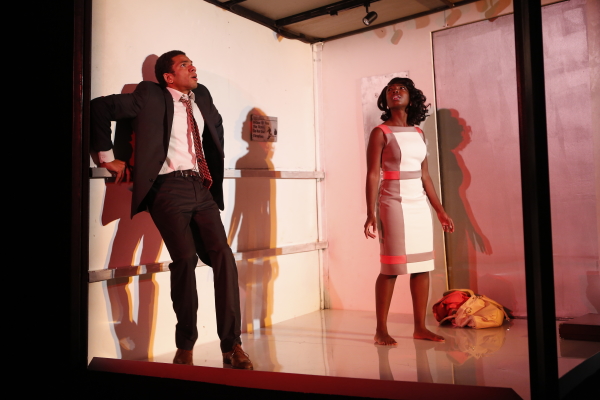
(© Carol Rosegg)
Walter Mosley, best known for crime fiction novels such as Devil in a Blue Dress, has taken a stab at playwriting with Lift, now making its New York premiere in a Crossroads Theatre Company production at 59E59 Theaters. The play deals with what happens when two aspiring African-American professionals are trapped in an office-building elevator during a terrorist attack. Though the play does have a couple of unexpected revelations that you might expect from a Mosley work, this production, directed by Marshall Jones III, lumbers through two meandering acts before delivering a dramatic yet predictable ending.
In a New York office building, Tina Pardon (MaameYaa Boafo) and Theodore Southmore (Biko Eisen-Martin), two African-American go-getters, meet by chance when he interrupts a conversation between Tina and her friend Noni (Shavonna Banks). Tina and Southmore then ride in an elevator with company boss Mr. Resterly (Martin Kushner), who nonchalantly opines his racist views of ethnic groups (and their place in the socioeconomic food chain) before exiting. Alone in the elevator, Tina and Southmore strike up a conversation when suddenly a terrorist attack damages the building and leaves them stranded. After a few desperate attempts to escape from the wobbly elevator, they talk about their diverse backgrounds and dreams, as well as Tina's interracial relationship, until Southmore begins writhing on the floor because of what he calls a "condition." When Tina learns the truth about Southmore, she is forced to do something morally abhorrent to save him while coming to terms with the implications of her own checkered past.
The idea of two people stranded in an elevator seems like a natural premise for a play dealing with the struggles of rising up the corporate ladder. The symbolism of a stalled elevator from which only some are able to escape is apt, and Lift, at first, promises insight into the struggles that some African-Americans have breaking through social, racial, and economic barriers. Unfortunately the play offers little beyond its initial premise. Both characters seem to exist more for shock value than for their ability to illuminate the effects of bigotry, poverty, and destructive self-loathing.
Boafo admirably portrays Tina, an Ivy League up-and-comer who came from poor circumstances and managed to support herself by landing a job in the S&M industry. Eisen-Martin captures the distress and self-hatred of Southmore, who struggles not only with horrific family guilt but with a debilitating addiction. But despite the fact that the play takes place in an elevator dangling precariously dozens of stories in the air, director Jones does little to create real dramatic tension within the confines of Andrei Onegin's awkwardly designed set until the play's final minutes. It doesn't help that the boxy, claustrophobic elevator is raised on a platform several feet in the air, making it difficult for audience members in the front rows to see the action taking place on top of the elevator as well as the projections (designed by Rocco Disanti) that are virtually invisible behind it.
A tighter script and an intermission-free production (especially given that the actors remain onstage and in character between the play's two acts) might have allowed for the suspenseful shot in the arm that this show needs. But two hours exceeds Lift's weight limit, making it a struggle to get off the ground floor.







